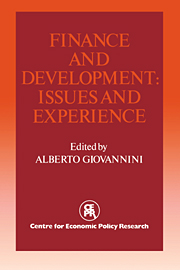39 results
6 - Real exchange rates and capital flows: EMS experiences
-
-
- Book:
- Capital Controls, Exchange Rates, and Monetary Policy in the World Economy
- Published online:
- 16 October 2009
- Print publication:
- 30 June 1995, pp 157-180
-
- Chapter
- Export citation
10 - Currency substitution: from the policy questions to the theory and back
-
-
- Book:
- Adjustment and Growth in the European Monetary Union
- Published online:
- 29 January 2010
- Print publication:
- 21 October 1993, pp 318-338
-
- Chapter
- Export citation
Discussion
-
-
- Book:
- Adjustment and Growth in the European Monetary Union
- Published online:
- 29 January 2010
- Print publication:
- 21 October 1993, pp 382-384
-
- Chapter
- Export citation
List of tables
-
- Book:
- Finance and Development
- Published online:
- 05 November 2011
- Print publication:
- 25 March 1993, pp xii-xiv
-
- Chapter
- Export citation
List of figures
-
- Book:
- Finance and Development
- Published online:
- 05 November 2011
- Print publication:
- 25 March 1993, pp xi-xi
-
- Chapter
- Export citation
PART I - THE ROLE OF FINANCE IN ECONOMIC DEVELOPMENT
-
- Book:
- Finance and Development
- Published online:
- 05 November 2011
- Print publication:
- 25 March 1993, pp 9-10
-
- Chapter
- Export citation
List of conference participants
-
- Book:
- Finance and Development
- Published online:
- 05 November 2011
- Print publication:
- 25 March 1993, pp xvi-xviii
-
- Chapter
- Export citation
Preface
-
-
- Book:
- Finance and Development
- Published online:
- 05 November 2011
- Print publication:
- 25 March 1993, pp xv-xv
-
- Chapter
- Export citation

Finance and Development
- Issues and Experience
-
- Published online:
- 05 November 2011
- Print publication:
- 25 March 1993
PART III - DEVELOPMENT FINANCE
-
- Book:
- Finance and Development
- Published online:
- 05 November 2011
- Print publication:
- 25 March 1993, pp 301-302
-
- Chapter
- Export citation
Frontmatter
-
- Book:
- Finance and Development
- Published online:
- 05 November 2011
- Print publication:
- 25 March 1993, pp i-vi
-
- Chapter
- Export citation
Contents
-
- Book:
- Finance and Development
- Published online:
- 05 November 2011
- Print publication:
- 25 March 1993, pp vii-x
-
- Chapter
- Export citation
PART IIA - CASE STUDIES – FINANCIAL MARKETS AND ECONOMIC DEVELOPMENT
-
- Book:
- Finance and Development
- Published online:
- 05 November 2011
- Print publication:
- 25 March 1993, pp 119-120
-
- Chapter
- Export citation
Index
-
- Book:
- Finance and Development
- Published online:
- 05 November 2011
- Print publication:
- 25 March 1993, pp 354-361
-
- Chapter
- Export citation
1 - Introduction
-
-
- Book:
- Finance and Development
- Published online:
- 05 November 2011
- Print publication:
- 25 March 1993, pp 1-8
-
- Chapter
- Export citation
PART IIB - CASE STUDIES – GOVERNMENT POLICIES
-
- Book:
- Finance and Development
- Published online:
- 05 November 2011
- Print publication:
- 25 March 1993, pp 221-222
-
- Chapter
- Export citation
7 - Fiscal federalism and optimum currency areas: evidence for Europe from the United States
-
-
- Book:
- Establishing a Central Bank
- Published online:
- 05 March 2012
- Print publication:
- 30 July 1992, pp 195-227
-
- Chapter
- Export citation
List of conference participants
-
- Book:
- European Financial Integration
- Published online:
- 04 August 2010
- Print publication:
- 04 April 1991, pp xvii-xviii
-
- Chapter
- Export citation
List of tables
-
- Book:
- European Financial Integration
- Published online:
- 04 August 2010
- Print publication:
- 04 April 1991, pp xiv-xv
-
- Chapter
- Export citation
List of figures
-
- Book:
- European Financial Integration
- Published online:
- 04 August 2010
- Print publication:
- 04 April 1991, pp xiii-xiii
-
- Chapter
- Export citation



